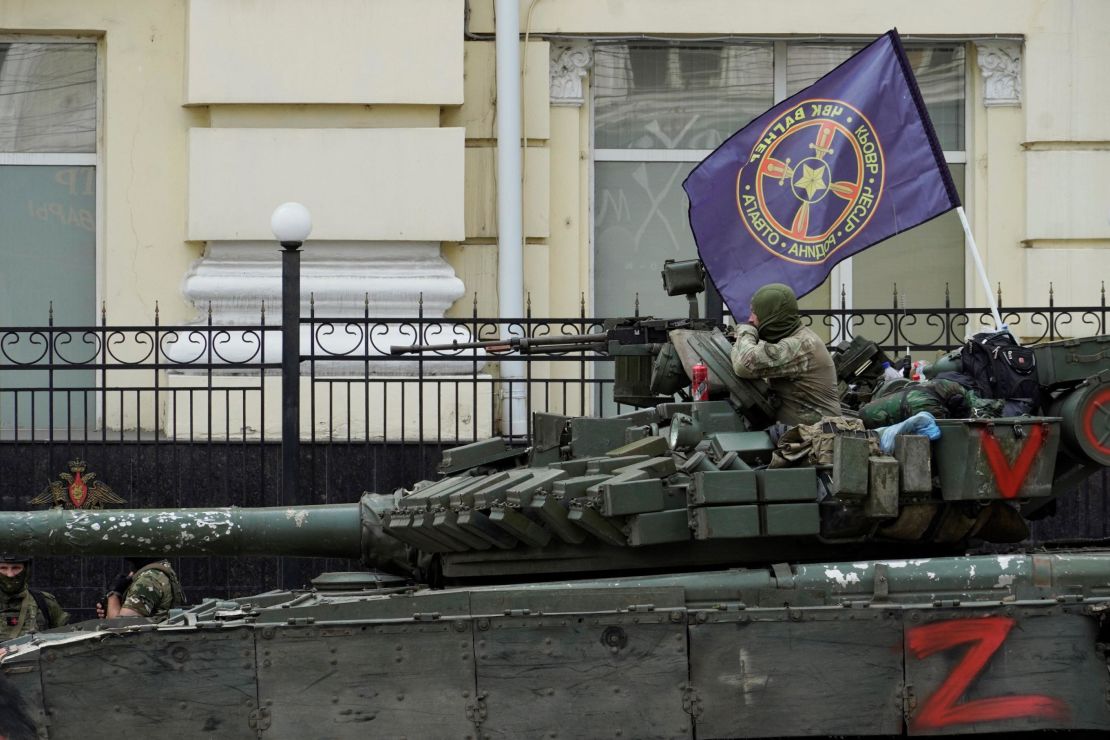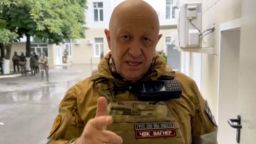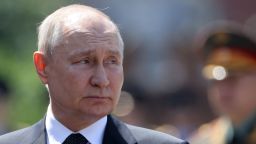The weekend’s events in Russia seem an almost surreal interruption to the long slog of conflict unfolding in neighboring Ukraine. Yevgeny Prigozhin’s challenge to the Russian state erupted and receded in the space of 24 hours, but the consequences of his short-lived mutiny may reverberate for much longer.
Prigozhin’s Wagner forces, for all his boasting, were never going to be a match for the Russian security forces. The march on Moscow comprised scattered convoys that had little shape and less direction – and insufficient firepower to challenge the regular military.
Despite Prigozhin’s bluster, there is virtually no evidence that any regular Russian units came over to Wagner’s side, though some may have opted not to confront them. In some ways, it was surprising that Prigozhin’s columns got as far as they did.
And yet, the saga was humiliating to the Russian military and at least embarrassing to the Kremlin. There was the bizarre recorded encounter between Prigozhin and two very senior military officers in Rostov-on-Don, during which he upbraided them like teenagers sentenced to detention (and said that Defense Minister Sergei Shoigu had run away).
Prigozhin and his men were able to take over the headquarters of the Southern Military District without a murmur, let alone a shot. Indeed, Russian regular forces (except for a couple of helicopters over the city of Voronezh) appear to have sleepwalked through the day’s events.
The brief drama forced a visibly angry President Vladimir Putin to address the nation early on Saturday and threaten Prigozhin with dire consequences, even raising the specter of civil war in the process. The much-prized sense of national purpose in an existential struggle against what Moscow falsely claims are Ukrainian neo-Nazis that were creatures of the West was punctured by what was at times a day of melodrama.
Some moments, such as the hasty erection of roadblocks on Moscow’s southern outskirts and the mobilization of Chechen special forces to move on Rostov, were reminiscent of the 1991 attempted coup by Soviet hardliners against Mikhail Gorbachev – not in a political sense but for the haphazard and inchoate nature of events.
Above all, the day exposed the transactional nature of relationships among Russian elites. What had begun as “treasonous” behavior and a criminal challenge to the state that must be ruthlessly dealt with ended with a tawdry deal brokered by the dictator next door that gave Prigozhin a “get-out-of-jail-free card,” and amnesty to the mutineers advancing on Moscow.
Putin left looking weaker
This was not lost on Kyiv, with an adviser to the head of the Ukrainian president’s office, Mikhailo Podolyak, saying that “at the end of the day, everything goes back to normal, (Prigozhin) is not a traitor, he is a hero of Russia, and so on. It’s a failed state.”
Russian state media has gone to great lengths to show how Putin was in control throughout. “The whole night the president has been in touch with all law enforcement structures,” said Pavel Zarubin, a state TV reporter on Sunday.
And in reality Russia “is not on the verge of a civil war or major upheaval, even if there is a not negligible level of discontent with the state of affairs across the country,” concludes Thomas Graham at the Council on Foreign Relations think tank.
But as Prigozhin was granted an escape route hours after betting the farm on overthrowing the military establishment, his departure from the scene still left Putin looking weaker, even a touch naïve.
For years Putin had tolerated and even encouraged Prigozhin’s ambitions, his Wagner private military company was at first a cheap way to project Russian power in Africa, perform basic guard duty in Syria and later serve as a useful counterweight to the defense establishment, which the Wagner chief reviled in ever more sulphuric language after the launch of the Ukraine operation.
Prigozhin’s activism, his plundering of Russian jails for cannon fodder, the readiness of his fighters to go on the offensive and ultimately take the city of Bakhmut despite hideous losses, was in contrast to the almost invisible leadership of the Defense Ministry and the ever-changing cast of generals leading the “special military operation.”
Putin indirectly scolded him this month after Prigozhin refused an order to register (and thereby defang) Wagner with the Defense Ministry (in trademark colorful language); but no action was taken. That attempt by the ministry may have tipped Prigozhin into his drastic demarche, but even if Putin saw it coming he failed to head it off. He said the actions of his former chef and St. Petersburg comrade were a “stab in the back.”
The leadership of the Defense Ministry, specifically Shoigu and Chief of the General Staff Valery Gerasimov, was silent and apparently absent throughout the crisis. Their already tarnished reputations appear to have taken another blow, while two senior generals did speak up – demanding Prigozhin end his escapade.
One Ukrainian officer noted with some satisfaction that “numerous senior officers responsible for decision-making chose to abstain from issuing orders or making decisive moves, opting to wait for the outcome.”
Fading veneer
It may take weeks for any personnel reshuffle to materialize in Moscow but “someone will have to take the blame for not nipping the rebellion in the bud. It is a fair bet that Putin will not blame himself. There will be much finger-pointing inside the Kremlin, as elite factions seek to save their own positions and erode their rivals’,” says CFR’s Graham.
The weekend’s events seem to have chipped away at the already fading veneer of Putin’s omniscience, eroded by a series of miscalculations in the planning and execution of the war and a severe underestimation of the West’s response.
How could such a pantomime unfold under the watch of the fabled ex-KGB agent, laying bare the rifts among Russian elites? As US Secretary of State Antony Blinken told CNN on Sunday, 16 months ago Russian forces had expected to take Kyiv “in a matter of days.”
“Now, they have to be focused on defending Moscow – Russia’s capital – against mercenaries and Putin’s own men.”
Graham echoes that.
“It will inevitably distract attention of Russia’s senior leaders from the war effort — and not only in the short-term … The Kremlin will have to devote greater resources to ensuring that no similar threat emerges in the future,” he writes.
In an authoritarian state, doubt is corrosive. Phillips O’Brien, professor of strategic studies at the University of St. Andrews in Scotland, says that “for a dictatorship built on the idea of unchallenged power, this was an extreme humiliation, and it’s hard to see the genie of doubt ever being forced back into the bottle.”
Hanna Notte, a senior associate at the Center for Strategic and International Studies, agrees – up to a point.
“It’s conceivable that the corrosion of his rule is in motion. And more importantly, that the process will continue,” Notte wrote on Twitter. “But there’s also the possibility that the immense dysfunctionality of the system we observed yday can prove quite durable & not become dangerous to #Putin.”
Putin appears to believe that he can wear down all opponents – the West, Ukraine and probably Prigozhin. And Notte says that if “Ukraine’s counter-offensive falls below expectations, the regime might prove less brittle than many thought.”

Fillip for the Ukrainians
The Kremlin may well use the upheaval to strengthen still further the apparatus of oppression, the one part of the Russian state that appears to work relatively efficiently.
Still unknown, the trickle-down effect of the weekend’s events on the rank-and-file Russian troops in Ukraine whose morale is already brittle. Many will likely be asking themselves yet again what they are fighting for as the Ukrainian counter-offensive gains pace.
And of course the episode is only a fillip for the Ukrainians. One Ukrainian military officer was provocatively shown on social media eating popcorn as he watched events in Russia unfold.
Podolyak says that “Prigozhin humiliated Putin/the state and showed that there is no longer a monopoly on violence,” and went on to mock the Russian state as a “flimsy structure held together by inertia on a wing and a prayer.”
Hyperbole of course, but as Ukraine’s counteroffensive struggles to gain momentum, the prospect (however faint) of an internal threat to Putin is likely a comforting thought.
As for Prigozhin, last seen shaking hands with admirers as he left Rostov: his current whereabouts are unknown.
But he released new audio on Monday explaining his decision to stop what he called a “march” on Moscow. Prigozhin claimed he wanted to avoid Russian bloodshed, and also said the march was a demonstration of protest, not an attempt to overturn power in the country.
He added that the Russian Defense Ministry had planned for his Wagner private military group to “cease to exist” from July 1.
“Prigozhin’s instrument is Telegram. Putin is famously not on the Internet; he apparently doesn’t understand social media. Big mistake,” says Stalin biographer Stephen Kotkin.
As for the bigger picture, Putin’s Kremlin “remained, and remains, viable as long as there is no political alternative,” Kotkin adds. “Now, we might see just how hollow the regime is. Putin has unwittingly launched a stress test of his own regime.”









